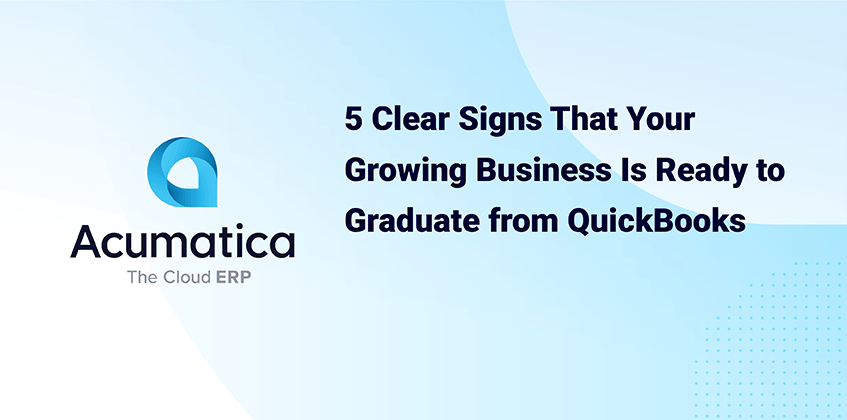
Small and midsized businesses (SMBs) fuel the US economy.
Many of these SMBs start from humble beginnings—with an idea, a spark of creativity, initiative, and ingenuity. This initial spark is the genesis of what can become a flourishing, growing company. And, in today’s digital economy, growing companies need the support of business management technology to help keep their operations organized and primed for further growth.
For many who are just starting a business, it makes sense to begin with very basic technology—like QuickBooks, which is tailor made for managing core accounting and financial needs.
But businesses with higher ambitions reach a critical juncture where they have to ask themselves a few important questions:
- Where is my business right now?
- Where do I want to take it?
- Do I have the right technology to get me there?
If you’re already asking yourselves these questions, then here are a few more for you. Are you ready to take your business to the next level? Are you ready to compete more vigorously in the market? Are you ready to realize your growth ambitions? If so, it may be time for you to become a QuickBooks Graduate and move to a more robust, comprehensive business management solution.
But how do you know if you’re ready to graduate? Let’s look at five clear signs.
Five Signs That You’re Ready to Become a QuickBooks Graduate
- Your number of employees is increasing.
As businesses scale, they invest in new employees. Onboarding new team members “gives your company the opportunity to expand into new areas and grow where you’ve already been successful.” But, as staff numbers increase, you have more employee data to juggle, more payroll operations to manage, and more people who need access to the data stored in your business management system.
Basic accounting systems, like QuickBooks, aren’t built to handle this much information and this many users. The largest on-premises QuickBooks Enterprise edition allows you to have 40 users working in the system at the same time, and the cloud-based QuickBooks Online editions allow for 25 users. For businesses with more users, this limitation can separate employees from the data they need to do their jobs—causing communication breakdowns, spurring manual workarounds, and encouraging companies to use other, disconnected software to fill the gaps, which just creates data silos.
- You are branching into multiple locations or plan to do so.
Maybe you’re opening new retail stores, or adding a warehouse facility, or branching into multiple distribution centers. Whatever the case may be, your company is physically expanding, and you need to be able to manage every location from one, comprehensive platform.
The QuickBooks on-premises editions simply can’t scale. If you go with QuickBooks Online, each location or tenant requires a separate subscription fee. So, for example, if you are a retailer with two stores to manage, you will be paying double what you would pay to manage one store. As you grow, you’ll need a more comprehensive system that doesn’t penalize you with extra subscription fees.
- Your number of customers and/or clients is increasing.
Today’s customers have high demands for fast, easy, personalized service. Customer Relationship Management (CRM) is the key to meeting these demands and forging strong relationships—turning buyers into loyal customers. Because QuickBooks focuses on accounting and finance, it does not have a native CRM module to store customer data, create customer self-service portals, or give customer service representatives instant access to client data. As your list of customers grows, these limitations can hinder your ability to quickly address customer needs.
- Your revenue is increasing and your financial needs are becoming more complex.
Growing businesses quickly move from basic to complex accounting needs. You may start making intercompany transactions, branching into new tax zones, and having to stay in step with different financial and regulatory requirements. You may have to manage leases, deal with complicated financial instruments (e.g., stocks, bonds, loans, etc.), or even grapple with the requirements of international operations.
Because QuickBooks has limited automation features that apply only to basic accounting needs, you can get stuck in a loop of manual and duplicated data entry—limiting your ability to keep track of complex financials. While QuickBooks does provide an audit log, that log only shows 150 records at a time, can only be printed 300 lines at a time, and cannot be exported to Excel—which makes it difficult to maintain a complete, accurate audit trail.
- You’re facing new, larger competitors.
Securing and keeping a competitive advantage often requires fighting fire with fire. Larger organizations are armed with robust business management technology that gives them instant access to companywide data; streamlines communication between employees in the back office, front office, and field; provides remote access for on-the-go projects; and facilitates quick, accurate decision-making. While QuickBooks can handle basic finances, it isn’t built to give you the data you need to run with this level of competition.
Many QuickBooks users who are outgrowing the solution also face some very real pain points. These include many manual workarounds that require extra employees to manage. They may devote more and more money and resources to technology upkeep—trying to force the system to keep pace with the speed of their operations. They may run into QuickBooks-induced delays, have trouble growing, and wind up paying ever-increasing fees for subscription renewals, costly and difficult to implement third-party applications, and hefty hardware requirements.
If this sounds like you, then you’re ready to graduate from QuickBooks to a new, advanced, comprehensive enterprise resource planning (ERP) system. But there are a lot of software options on the market, so, what system should you choose?
Becoming a QuickBooks Graduate
If you work for a business that is ready to get to a new level of growth and success, then Acumatica may be the answer for you.
Many other QuickBooks Graduates have found Acumatica to be an ideal fit for their growing and increasingly complex business needs—a total package free from the limitations of QuickBooks. They rely on Acumatica’s flexible licensing model, its streamlined multi-tenant and intercompany accounting module, its CRM and payroll applications, its comprehensive financial management features, its built-for-the-cloud security and mobile access, and so much more that they are not currently getting from QuickBooks.
But what system functions should you look for in an ERP system to best serve your growing business? We’ll cover that in an upcoming blog, so stay tuned!
 Canada (English)
Canada (English)
 Columbia
Columbia
 Caribbean and Puerto Rico
Caribbean and Puerto Rico
 Ecuador
Ecuador
 India
India
 Indonesia
Indonesia
 Ireland
Ireland
 Malasya
Malasya
 Mexico
Mexico
 Panama
Panama
 Peru
Peru
 Philippines
Philippines
 Singapore
Singapore
 South Africa
South Africa
 Sri-Lanka
Sri-Lanka
 Thailand
Thailand
 United Kingdom
United Kingdom
 United States
United States







